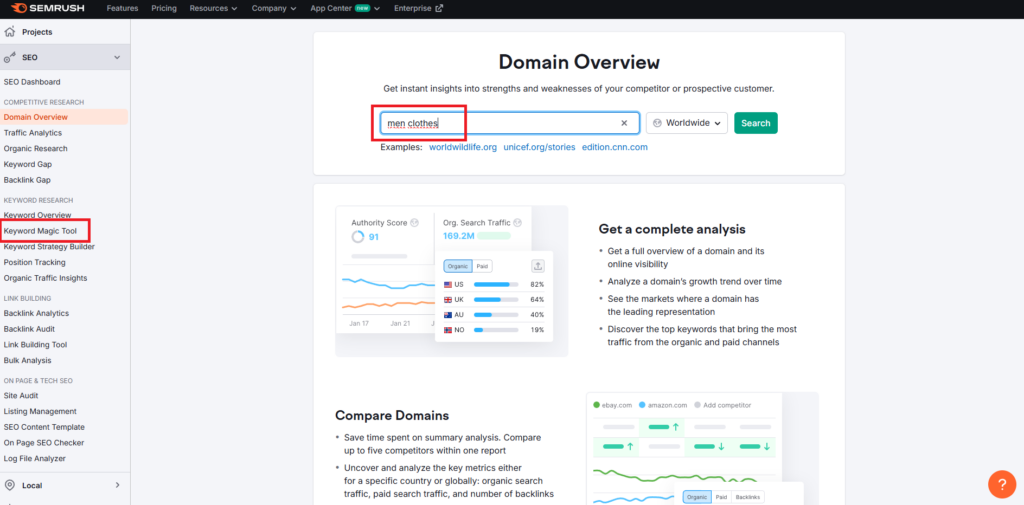Table of Contents
Find keywords for your website using SEMrush – In the realm of digital marketing, keyword research is the cornerstone of a successful SEO strategy. It involves identifying the specific words and phrases that people use to search for information online. By understanding these keywords, you can optimize your website content to attract more organic traffic and improve your search engine rankings.
What is SEMrush?
SEMrush is a powerful digital marketing tool that helps you find keywords for your website. It’s a powerful tool that can help you uncover valuable insights into your target audience’s search behavior.
Why Keyword Research Matters
Before diving into how to use SEMrush, let’s understand why keyword research is crucial for SEO success:
- Improved Search Engine Rankings: By targeting relevant keywords, you increase your chances of ranking higher in search engine results pages (SERPs).
- Increased Organic Traffic: Higher search engine rankings lead to more organic traffic, which means more potential customers visiting your website.
- Better User Experience: Keyword research helps you create content that addresses your audience’s specific needs and interests, enhancing their overall user experience.
- Competitive Advantage: By understanding your competitors’ keyword strategies, you can identify opportunities to differentiate yourself and gain a competitive edge.
How to Use SEMrush for Keyword Research
1. Create a SEMrush Account:
- Sign up for a SEMrush account, choosing a plan that suits your needs.
- Once you’ve logged in, you’ll be presented with the main dashboard.
2. Keyword Overview Tool:
- This tool provides a comprehensive overview of a specific keyword.
- Enter a relevant keyword in the search bar.
- The tool will display various metrics, including:
- Search Volume: The estimated number of monthly searches for the keyword.
- Keyword Difficulty: A measure of how competitive the keyword is.
- SERP Features: The types of search features (e.g., featured snippets, knowledge panels) that appear for the keyword.
- Related Keywords: A list of related keywords that users might also search for.
3. Keyword Magic Tool:
- This tool helps you generate a vast list of keyword ideas based on a seed keyword.
- Enter a seed keyword and click “Search.”
- Use the filters to refine your search results based on:
- Search Volume: Filter keywords by search volume to target high-traffic terms.
- Keyword Difficulty: Target keywords with a lower difficulty to improve your chances of ranking.
- Phrase Match: Find exact match keywords.
- Related Keywords: Discover related keywords that you might not have considered.

4. Organic Research Tool:
- This tool allows you to analyze your website’s organic search performance.
- Enter your domain name and click “Search.”
- The tool will display a list of keywords that your website currently ranks for, along with their positions and search volume.
- You can use this information to identify opportunities for improvement and discover new keyword opportunities.
5. Keyword Gap Tool:
- This tool helps you identify keyword gaps between your website and your competitors.
- Enter your domain and your competitors’ domains.
- The tool will compare your keyword rankings and highlight keywords that your competitors rank for but you don’t.
- This information can help you identify untapped opportunities to improve your organic search visibility.
Tips for Effective Keyword Research with SEMrush
- Understand Search Intent: Consider the user’s intent behind the search query. Are they looking for information, a product, or a service?
- Target Long-Tail Keywords: Long-tail keywords are more specific and often have lower competition.
- Prioritize Relevant Keywords: Focus on keywords that are relevant to your target audience and your business goals.
- Use Keyword Difficulty Score: Use the keyword difficulty score to identify keywords that are achievable for your website.
- Track Your Progress: Monitor your keyword rankings and adjust your strategy as needed.
Additional Tips for Keyword Research:
- Use SEMrush’s SERP Analysis Tool: This tool allows you to analyze the top-ranking pages for a specific keyword. You can use this information to identify opportunities to improve your content.
- Use SEMrush’s Topic Research Tool: This tool helps you generate topic ideas based on a seed keyword. You can use these topics to create new blog posts or articles.
- Use SEMrush’s Keyword Difficulty Checker: This tool allows you to check the difficulty of a specific keyword. This can help you identify keywords that are worth targeting.
By using SEMrush’s keyword research tools effectively, you can improve your website’s ranking, attract more visitors, and achieve your SEO goals. Remember, keyword research is an ongoing process. As your business evolves, so should your keyword strategy.

Leave a Reply
You must be logged in to post a comment.